Soviet and Post-Soviet Politics and Society


 Edited by Dr. Andreas Umland
Edited by Dr. Andreas Umland
2022




 Edited by Dr. Andreas Umland
Edited by Dr. Andreas Umland

Prof. Ellen Bos, Andrássy University of Budapest
Dr. Ingmar Bredies, FH Bund, Brühl
Dr. Andrey Kazantsev, MGIMO (U) MID RF, Moscow
Dr. Heiko Pleines, University of Bremen
Prof. Richard Sakwa, University of Kent at Canterbury
Dr. Sarah Whitmore, Oxford Brookes University
Dr. Harald Wydra, University of Cambridge
Col. David Glantz, "Journal of Slavic Military Studies"
Dr. Marlène Laruelle, George Washington University
Dr. Stephen Shulman, Southern Illinois University
Prof. Stefan Troebst, University of Leipzig
Prof. em. Marshall Goldman, Wellesley College, Mass.
Dr. Andreas Goldthau, Central European University
Dr. Robert Kravchuk, University of North Carolina
Dr. David Lane, University of Cambridge
Dr. Carol Leonard, Higher School of Economics, Moscow
Dr. Maria Popova, McGill University, Montreal
Prof. Dominique Arel, University of Ottawa Prof. Jörg Baberowski, Humboldt University of Berlin
Prof. Margarita Balmaceda, Seton Hall University
Dr. John Barber, University of Cambridge
Prof. Timm Beichelt, European University Viadrina
Dr. Katrin Boeckh, University of Munich
Prof. em. Archie Brown, University of Oxford
Dr. Vyacheslav Bryukhovetsky, Kyiv-Mohyla Academy
Prof. Timothy Colton, Harvard University, Cambridge
Prof. Paul D’Anieri, University of Florida
Dr. Heike Dörrenbächer, Friedrich Naumann Foundation
Dr. John Dunlop, Hoover Institution, Stanford, California
Dr. Sabine Fischer, SWP, Berlin
Dr. Geir Flikke, NUPI, Oslo
Prof. David Galbreath, University of Bath
Prof. Alexander Galkin, Russian Academy of Sciences
Prof. Frank Golczewski, University of Hamburg
Dr. Nikolas Gvosdev, Naval War College, Newport, RI
Prof. Mark von Hagen, Arizona State University
Dr. Guido Hausmann, University of Munich
Prof. Dale Herspring, Kansas State University
Dr. Stefani Hoffman, Hebrew University of Jerusalem
Prof. Mikhail Ilyin, MGIMO (U) MID RF, Moscow
Prof. Vladimir Kantor, Higher School of Economics
Dr. Ivan Katchanovski, University of Ottawa
Prof. em. Andrzej Korbonski, University of California
Dr. Iris Kempe, "Caucasus Analytical Digest"
Prof. Herbert Küpper, Institut für Ostrecht Regensburg
Dr. Rainer Lindner, CEEER, Berlin
Dr. Vladimir Malakhov, Russian Academy of Sciences
Dr. Peter Duncan, University College London
Prof. Andreas Heinemann-Grüder, University of Bonn
Dr. Taras Kuzio, Johns Hopkins University
Prof. Gerhard Mangott, University of Innsbruck Dr. Diana Schmidt-Pfister, University of Konstanz Dr. Lisbeth Tarlow, Harvard University, Cambridge Dr. Christian Wipperfürth, N-Ost Network, Berlin Dr. William Zimmerman, University of Michigan
Dr. Catherine Andreyev, University of Oxford Prof. Mark Bassin, Södertörn University
Prof. Karsten Brüggemann, Tallinn University
Dr. Alexander Etkind, University of Cambridge
Dr. Gasan Gusejnov, Moscow State University
Prof. em. Walter Laqueur, Georgetown University Prof. Leonid Luks, Catholic University of Eichstaett
Dr. Olga Malinova, Russian Academy of Sciences
Dr. Andrei Rogatchevski, University of Glasgow Dr. Mark Tauger, West Virginia University
Dr. Luke March, University of Edinburgh Prof. Michael McFaul, Stanford University, Palo Alto Prof. Birgit Menzel, University of Mainz-Germersheim Prof. Valery Mikhailenko, The Urals State University Prof. Emil Pain, Higher School of Economics, Moscow
Dr. Oleg Podvintsev, Russian Academy of Sciences Prof. Olga Popova, St. Petersburg State University
Dr. Alex Pravda, University of Oxford
Dr. Erik van Ree, University of Amsterdam
Dr. Joachim Rogall, Robert Bosch Foundation Stuttgart Prof. Peter Rutland, Wesleyan University, Middletown Prof. Marat Salikov, The Urals State Law Academy
Dr. Gwendolyn Sasse, University of Oxford Prof. Jutta Scherrer, EHESS, Paris Prof. Robert Service, University of Oxford
Mr. James Sherr, RIIA Chatham House London
Dr. Oxana Shevel, Tufts University, Medford Prof. Eberhard Schneider, University of Siegen Prof. Olexander Shnyrkov, Shevchenko University, Kyiv Prof. Hans-Henning Schröder, SWP, Berlin
Prof. Yuri Shapoval, Ukrainian Academy of Sciences
Prof. Viktor Shnirelman, Russian Academy of Sciences
Dr. Lisa Sundstrom, University of British Columbia
Dr. Philip Walters, "Religion, State and Society", Oxford
Prof. Zenon Wasyliw, Ithaca College, New York State
Dr. Lucan Way, University of Toronto
Dr. Markus Wehner, "Frankfurter Allgemeine Zeitung"
Dr. Andrew Wilson, University College London Prof. Jan Zielonka, University of Oxford
Prof. Andrei Zorin, University of Oxford
The book series Soviet and Post-Soviet Politics and Society (SPPS), launched in 2004, publishes new empirical research on understudied aspects of communist history and the post-Soviet transitions.
With 150 titles available in English, German, and Russian, SPPS is a comprehensive resource on the recent history and current affairs of the newly independent states of Central and Eastern Europe, the Southern Caucasus, and Central Asia.
One of the series‘ goals is to identify topics that have remained below the radar of mainstream international research. Many important aspects of the transformation of the former Warsaw Pact states have not yet been systematically analyzed. SPPS provides an opportunity to publish original research.
Apart from publishing established scholars, SPPS encourages submissions by PhD students or firsttime authors of both monographs and edited collections. Occasionally, we also re-publish collections of previously printed papers and translations of books not yet available in English or German.
All SPPS titles are published as paperbacks, allowing for the widest possible dissemination. Submis sions are reviewed and chosen by independent reviewers or/and a select Editorial Committee and Advisory Board, headed by the Series‘ Editor Dr Andreas Umland (Kyiv, Ukraine).
Authors, reviewers, referees, and editors for (as well as all other persons sympathetic to) SPPS are invited to join its networks at
www.facebook.com/SovietAndPostSovietPoliticsAndSociety/ www.linkedin.com/groups/103012 vk.com/public106310754 independent.academia.edu/SovietandPostSovietPoliticsandSociety plus.google.com/108172389786012659650/ www.xing.com/net/spps-ibidem-verlag
Melchiorstraße 15 70439 Stuttgart Germany
Phone: +49 (0) 711 9 80 79 54 Fax: +49 (0) 711 8 00 18 89 E-mail: ibidem@ibidem.eu www.ibidem.eu
Your contact: Christian Schön rights@ibidem.eu
Author Support Your contact: Jessica Haunschild authors@ibidem.eu
Your contact: Sarah Kwekkeboom publicity@ibidem.eu
London Office 4 Osborne Mews E17 6QA, London
United Kingdom
Your contact: Jakob Horstmann mjh@ibidem.eu
Leuschnerstr. 40 30457 Hannover Germany
Phone: +49 (0) 511 2 62 22 00 Fax: +49 (0) 511 2 62 22 01
Your contact: Michaela Nickel E-mail: sales@ibidem.eu
Verkehrsnummer: 13898
You can order particular volumes using their respective ISB Numbers, or subscribe to the entire series using its general ISN Number (1614-3515).


To subscribe to the series Soviet and Post-Soviet Politics and Society, please send an e-mail with your invoice and shipping address to spps@ibidem.eu.
The subscription may be cancelled at any time.
You may also order through www.ibidem.eu/spps.html

The Deportation, Special Settlement, and Mobilization into the Labor Army of Ethnic Germans in the USSR, 1941–1955 03 / 2022. 298 Seiten
€ 34,90 , Paperback
ISBN 978-3-8382-1630-0
€ 22,99 , e-book ISBN 978-3-8382-7630-4
This monograph provides a detailed yet concise narrative of the history of the ethnic Germans in the Russian Empire and USSR. It starts with the settlement in the Russian Empire by German colonists in the Volga, Black Sea, and other regions in 1764, tracing their development and Tsarist state policies towards them up until 1917. After the Bolshevik Revolution, Soviet policy towards its ethnic Germ ans varied. It shifted from a generally favorable policy in the 1920s to a much more oppressive one in the 1930s, i.e. already before the Soviet-German war. J. Otto Pohl traces the development of Soviet repression of ethnic Germans. In particular, he focuses on the years 1941 to 1955 during which this oppression reached its peak. These years became known as “the Years of Great Silence” (“die Jahre des grossen Schweigens”). In fact, until the era of glasnost (transparency) and perestroika (rebuilding) in the late 1980s, the events that defined these years for the Soviet Germans could not be legally resear ched, written about, or even publicly spoken about, within the USSR.

03 / 2022. 388 Seiten
€ 49,90 , Paperback
ISBN 978-3-8382-1641-6
€ 32,99 , e-book ISBN 978-3-8382-7641-0
The recent history of post-Soviet societies is heavily shaped by the successor nations’ efforts to geopo litically re-identify themselves and to reify certain majorities in them. As a result of these fascinating processes, various new ideologies have appeared. Some are specific to the post-Soviet space while others are comparable to ideational processes in other parts of the world. In this collected volume, an international group of contributors delves deeper into recent theoretical constructions of various post-Soviet majorities, the ideologies that justify them, and some respectively formulated policy pre scriptions. The first part analyzes post-Soviet state-builders’ fixation on certain constructed majorities as well as on these imagined communities’ symbolic self-identifications, in- or outward othering, and national languages. The second part deals specifically with post-Soviet ideas of sovereigntism and the way they define majorities as well as imply changes in internal and external policies and legal systems. These processes are analyzed in comparison to similar phenomena in Western societies. The book’s contributors include (in the order of their appearance): Natalia Kudriavtseva, Petra Colmorgen, Nadiia Koval, Ivan Gomza, Augusto Dala Costa, Roman Horbyk, Yana Prymachenko, Yuliya Yurchuk, Olek sandr Fisun, Nataliya Vinnykova, Ruslan Zaporozhchenko, Mikhail Minakov, Gulnara Shaikhutdinova, and Yurii Mielkov.
„In this volume Mikhail Minakov has carefully selected a unique group of experts to assemble a path-breaking and challenging volume. The volume focuses on perhaps the most critical and most neglected question in the field today- the invention and construction of „majorities“ in post-So viet space. The brilliance of the volume is in this: instead of viewing majorities as solely reductions, as impositions from outside powers, Minakov and the collecti on‘s authors underscore that majorities, for good and ill, are the consequence of political imaginaries by active, self-fashioning political agents. Thus, the authors present the post-Soviet space as a place of articulated and rearticulated ideolo gies, and of self and group conceptions, symbolic developments of worldview and of collective space.“
Christopher Donohue, National Human Genome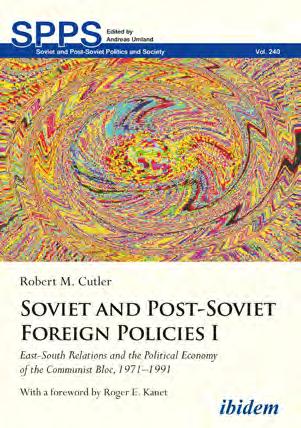
Relations and the Political Economy of the Communist Bloc, 1971–1991
This collection of studies investigates the political economy of international relations between the Soviet bloc (the “East”) and the developing world (the “South”), spanning the entire post-Stalin era while focusing on the 1970s and 1980s. The works examine East-South relations from the standpoints of international trade patterns, financial transfers, military relations including their economic angle, interactions within the United Nations Conference on Trade and Development (UNCTAD), and the international legal framework for trade embedded in the “socialist offensive in international law.” The chapters provide extensive bibliographies making this volume a handbook of great interest not only to researchers, but also to university students and the general public.
“These carefully researched works advance our understanding of Soviet-bloc international relations.”
—Former Cummings Memorial Professor of International Affairs Allen Lynch, Department of Politics, Univer sity of Virginia
Soviet and PostSoviet Politics and Society
Stories of Rural Women from Serbia, Romania, and Hungary, 1920–2020
/ 2022. 484 Seiten
49,90 , Paperback
978-3-8382-1602-7
32,99 , e-book
978-3-8382-7602-1
Rural women have not had a formative role in the public histories of Central Eastern Europe. Izabel la Agárdi aims to correct that by concentrating on their life stories and their connections to general histories. She investigates how Hungarian-speaking, ordinary women in rural contexts born in the 1920s and 1930s remember and talk about the twentieth century they have experienced, and how, through their stories, they articulate historical change and construct themselves as historical subjects. In her analysis, Izabella Agárdi traces the interactions between micro- and macro- narratives as well as the specific tools women of this generation appropriate to talk about personal memories of their often traumatic past. From these stories, a particular mnemonic community emerges, one that speaks from a highly precarious position ‘on the verge of history’. It is up to future generations whether these women’s experiences will be remembered or forgotten.

Identity and Foreign Policy in Poland, Bulgaria, and Russia since 1989
/ 2022. 496 Seiten
49,90 , Paperback
978-3-8382-1649-2
32,99 , e-book ISBN 978-3-8382-7649-6
This comparative study harks back to the revolutionary year of 1989 and asks two critical questions about the resulting reconfiguration of Europe in the aftermath of the collapse of communism: Why did Central and East European states display such divergent outcomes of their socio-political transitions? Why did three of those states—Poland, Bulgaria, and Russia—differ so starkly in terms of the pace and extent of their integration into Europe? Rumena Filipova argues that Poland’s, Bulgaria’s, and Russia’s dominating conceptions of national identity have principally shaped these countries’ foreign policy behavior after 1989. Such an explanation of these three nations’ diverging degrees of Europeanization stands in contrast to institutionalist-rationalist, interest-based accounts of democratic transition and international integration in post-communist Europe. She thereby makes a case for the need to include ideational factors into the study of International Relations and demonstrates that identities are not easily malleable and may not be as fluid as often assumed. She proposes a theoretical “middle-ground” argument that calls for “qualified post-positivism” as an integrated perspective that combines positivist and post-positivist orientations in the study of IR.
„A forensic account of varying Eastern and Central European perspectives on the process of Euro-Atlantic integration in post-communist Europe since 1989 with a particular focus on Poland, Bulgaria, and Russia. The book is an innovative and, in many respects, cautionary tale, reminding that the tortuous process of integration depended on long-term culturally and historically embedded attitudes and affinities— and therefore could not start from scratch.“
 —Neil MacFarlane, Lester B Pearson Professor of International Relations, University of Oxford
—Neil MacFarlane, Lester B Pearson Professor of International Relations, University of Oxford
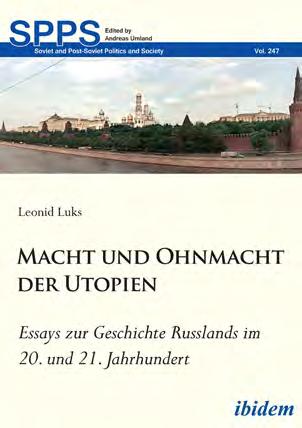
978-3-8382-7677-9
Im Oktober 1917 errichteten die Bolschewiki in Russland das erste totalitäre Regime der Moderne, den ersten Staat, der die von Marx und Engels bereits im „Manifest der Kommunistischen Partei“ entwickelte Utopie zu verwirklichen suchte. Diese Utopie stellte auch die wichtigste legitimatorische Grundlage des von den Bolschewiki errichteten Systems dar. Denn auf eine demokratische Legitima tion hatten sie verzichtet, als sie am 19. Januar 1918 die russische Konstituante mit ihrer nichtbolsche wistischen Mehrheit gewaltsam auseinanderjagten. 70 Jahre später erlebte indes die bolschewistische Vision von der „lichten kommunistischen Zukunft“ eine gänzliche Erosion. So gut wie niemand nahm sie noch ernst – weder die Herrscher noch die Beherrschten. Das nun entstandene legitimatorische Vakuum konnte nur durch die Rückkehr der demokratischen Institutionen gefüllt werden, die die Bol schewiki kurz nach ihrer Machtübernahme von der politischen Bühne Russlands verjagt hatten. Dies ist in der Gorbatschow-Periode auch teilweise geschehen. Der Versuch der kommunistischen Dog matiker, diesen Prozess rückgängig zu machen, scheiterte im August 1991 kläglich. Aber einige Jahre später verspielten auch die siegreichen Demokraten weitgehend ihr Vertrauenskapital. Damals begann man in Ost und West wiederholt, Parallelen zwischen der Weimarer Republik und dem postsowjeti schen Russland zu ziehen. Diesen Entwicklungen sind die Beiträge des vorliegenden Bandes gewidmet.
Der Sieg der Euromaidan-Revolution, russische Anschluss der Krim und Beginn des Krieges im Donbas im Laufe des Jahres 2014 waren Glieder einer sich bis heute fortsetzenden hochkomplexen Ereigniskette. Sie haben die internationale Gemeinschaft sowie insbesondere die Europäische Union in neuer Form herausgefordert. In diesem Buch wird die Reaktion der EU auf den ukrainisch-russischen Konflikt mittels einer detaillierten Untersuchung des auswärtigen Handelns der EU bis ins Jahr 2019 beleuchtet. Wie haben sich EU-Akteure im ukrainisch-russischen Konflikt positioniert und versucht ihren Beitrag zur Konfliktbeilegung zu leisten? Es wird insbesondere die Komplexität des Konflikts in und um die Ukraine seit Beginn der Euromaidan-Revolution Ende 2013 verdeutlicht – einschließlich politischer, wirtschaftlicher und kultureller Zusammenhänge im Kontext hochsensibler außenpoliti scher Themen der EU. Warum und in welcher Weise waren einzelne EU-Institutionen und -Mitglied staaten in Versuche zur Konfliktbeilegung in der Ukraine involviert? Auf Grundlage eines Prinzi pal-Agenten-Modells und des Actorness-Ansatzes werden verschiedene Problemfelder, mit denen sich die EU auseinandersetzen musste, analysiert. In welchem Maße und auf welche Art gelang beziehungs weise misslang es der Union ihre Akteursrolle in Krisen- und Konfliktsituationen zu stärken sowie ihre außenpolitische Autonomie zu erhöhen? Diese theoriegeleitete politik-, verwaltungs- und rechtswis senschaftliche Fallstudie leistet einen quellen- und datengesättigten Beitrag zur laufenden Diskussion über Delegationsbeziehungen innerhalb der EU sowie ihre Handlungsfähigkeit bei der Beilegung internationaler Konflikte.
Die Autorin: Dr. Iuliia Barshadska, geb. 1990, studierte Jura und Politologie mit dem Schwerpunkt Deutschland- und Europastudien in Kyjiw und Jena. Von 2017 bis 2021 promovierte sie an der Friedrich-Schiller-Universität Jena als Stipendiatin der Friedrich-Naumann-Stiftung für die Freiheit. Barshadska ist Mitglied der Deutsch-Ukrainischen Akademischen Gesellschaft e.V. Sie lebt und arbeitet in München.
Der Vorwortautor: Apl. Prof. Dr. Olaf Leiße ist Leiter des Arbeitsbereichs Europäische Studien am Institut für Politikwissenschaft der Friedrich-Schil ler-Universität Jena.
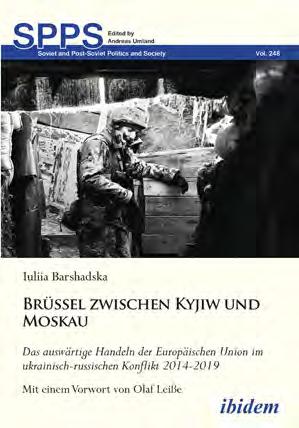

/ 2022. 540 Seiten
€ 54,90 , Paperback
ISBN 978-3-8382-1671-3
36,99 , e-book
978-3-8382-7671-7
Oleksandra Keudel proposes a novel explanation for why some local governments in hybrid regimes enable citizen participation while others restrict it. She argues that mechanisms for citizen partici pation are by-products of political dynamics of informal business-political (patronal) networks that seek domination over local governments. Against the backdrop of either competition or coordination between patronal networks in their localities, municipal leaders cherry-pick citizen participation me chanisms as a tactic to sustain their own access to resources and functions of local governments. This argument is based on an in-depth comparative analysis of patronal network arrangements and the ad option of citizen participation mechanisms in five urban municipalities in Ukraine during 2015–2019: Chernivtsi, Kharkiv, Kropyvnytskyi, Lviv, and Odesa. Fifty-seven interviews with citizen participation experts, local politicians and officials, representatives of civil society and the media, as well as utilizati on of secondary analytical sources, official government data, and media reports provide a rich basis for an investigation of context-specific choices of municipal leaders that result in varying mechanisms for citizen participation.
„Why would public authorities willingly devolve to the less powerful some of the decision-making power that they struggled so hard to acquire? While some might presume that this would only happen under the pressure of strong civil society networks, Oleksandra Keudel answers this question from the perspective of local politici ans. In a rare example of scholarship on citizen participation in hybrid regimes, the author plunges into the logic of patron-client networks in five Ukrainian cities to show how political leaders use participatory politics to their own benefit. Founded in rigorous comparative analysis and a sophisticated theoretical framework, her original approach illuminates a less studied side of participatory politics: not so much a bottom-up transformation, but rather a resource managed by local elites in their disputes for power.“
—Rebecca Abers, Professor of Political Science, University of Brasília
This book views the Ukrainian Revolution of Dignity, from a broad systemic perspective, as an ongo ing process in which societal, economic, political, and institutional developments are intertwined. The Euromaidan and further developments, especially the Russian aggression, accelerated the westward reorientation of the economy, strengthened institutional checks and balances (for instance, through decentralization), changed the main social cleavage from an ethnolinguistic one to a division between urban creative and “oligarchic” classes, reshaped identity towards formation of a political nation, and increased the role of modernizing forces, especially civil society. However, so far, the Revolution has failed to bring about, despite some progress, a critical mass of changes regarding the rule of law while much of the economy remains rent-oriented. If modernizing forces are prudently managed, Ukraine has a chance to move forward on an evolutionary path. Otherwise, new conflicts are possible.

This volume by an international group of historians presents case studies on the use and types of physi cal violence in the USSR and Moscow’s European satellite states after the death of Joseph Stalin. While communist rule until 1953 was characterized by repression and mass-terror, violence came to play a lesser role under Stalin’s successors. Within the methodological approach of Neue Gewaltforschung („New Research on Violence“), the papers gathered in this collection present novel insights into the motives and nature of physical violence—both in the public and private realms—during the last deca des of state socialism in the USSR and Eastern Europe. The studies cover such crucial subjects as the GULag, war and the military, as well as childhood and sexual violence.

Ukraine is again—since its annexation of Crimea in February 2014 and the ongoing war in the Don bass—the stage of the largest crisis in Europe since the end of the Cold War. When it comes to under standing the resolution and prevention of complex hybrid conflicts, theories in international relations are trapped in their state-centered perspectives. Meanwhile, the role of the individual actor, alone or organized, often remains underestimated as political and moral agent. In this book, Marc Raphael Dietrich sheds light on a critical yet politically practicable notion of cosmopolitanism which centers on the individual and is framed by a set of universal principles, thus providing valuable alternative insights on the Crimea and Donbas conflict.


The post-2014 decentralization policy is consolidating the center-periphery relations in Ukraine. Already before 2014, domestic policymakers had been drafting proposals for local amalgamation and an increase of regional authority. Before the 2020 watershed subnational elections, only the local amalgamation policy was completed, however. A significant repercussion of the post-2014 decentrali zation reform has been a sharp decrease in congruence of the shares of competing national parties in the parliamentary, regional, and municipal electoral arenas. On the other hand, the party system has, at the municipal level, become less fragmented. Regional councils have, in contrast, remained highly frag mented. The outcomes of the indirect elections of regional councils’ heads have benefitted Ukraine’s ruling party. Methodologically, the book illustrates the added value of investigating elections from a multilevel perspective. It contributes to the comparative exploration of party systems change over time, and constitutes a case study of more general patterns of interaction between municipal decentralization and political development in democratizing states.

Seiten
Paperback
978-3-8382-1615-7
The geopolitics of post-communist Europe are not only important for Ukraine itself, but ultimately also for the future of the continent as a whole. This concerns the interactions between Kyiv, on the one hand, and the capitals of East-Central Europe as well as the Southern Caucasus, on the other. Where does Kyiv currently stand geopolitically and how should it engage in the region between the Baltic, Adriatic, Black, and Caspian Seas? This volume examines which interests and motivations some select countries in East-Central Europe and the Caucasus have towards Ukraine and provides answers to the question which chances there are for new multilateral networks or structures. Such multilateralism around Ukraine could go beyond the already existing, yet geographically and functionally circum scribed Organization for Democracy and Economic Development (GUAM), the Visegrad Four, the Bucharest Nine Group, and the Three Seas Initiative. The volume also illustrates how the ever-present “elephant in the room”—Russia—shapes the international relations of the post-Soviet space. Resear chers from several post-communist countries examine these issues from their specific points of view.
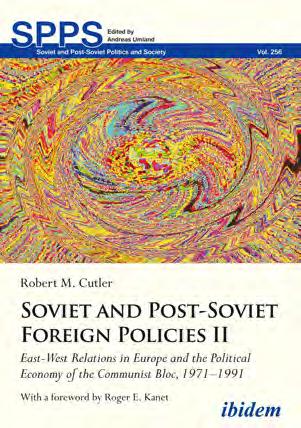
2022. 270 Seiten
34,90
Paperback
978-3-8382-1727-7
This collection of studies investigates the political economy of international relations between the Soviet bloc and West European countries, both individually and cohering as the European Economic Community / European Communities. It spans the entire post-Stalin era, focusing on the 1970s and 1980s. The works examine international trade patterns in East–West relations; Soviet views of West European integration and their influence on practice, also for the bloc as a whole; and reciprocal effects on Soviet domestic politics and foreign policy more under Gorbachev and in historical perspective. Extensive references make this volume a handbook which is of interest not only to researchers, but also to university students and the general public.
THREE REVOLUTIONS: MOBILIZATION AND CHANGE IN CONTEMPRARY UKRAINE III Archival Records and Historical Sources on the 1990 Revolution on Granite

09 / 2022. 412 Seiten
ISBN 978-3-8382-1376-7 € 49,90 , Paperback
€ 32,99 , e-book ISBN 978-3-8382-7376-1
The third instalment of this multi-volume project presents a selection of archival sources from the time of Ukraine’s Revolution on Granite in October 1990. They include telegrams sent to participants of the Revolution from supporters in different parts of Ukraine, KGB documents such as internal notes and other records, as well as transcripts of parliamentary sessions from the time of the revolution. All ma terials included in the volume are published in two languages: the original language of the document (Ukrainian or Russian) and in English translation. The publication completes two earlier SPPS volu mes: Three Revolutions: Mobilization and Change in Contemporary Ukraine I – Theoretical Aspects and Analyses on Religion, Memory, and Identity edited by Pawe? Kowal, Georges Mink, and Iwona Reichardt (2019), and Three Revolutions: Mobilization and Change in Contemporary Ukraine II – An Oral History of the Revolution on Granite, Orange Revolution, and Revolution of Dignity edited by Pawe? Kowal, Georges Mink, Iwona Reichardt, and Adam Reichardt (2019).
This timely book provides a comprehensive analysis of political uncertainty and one of the first efforts to empirically measure it. Gergana Dimova compares political ambiguity within both established as well as unconsolidated democracies and explores institutional, behavioral, and media factors influen cing such uncertainty. Combining aggregate statistical analysis and qualitative case studies, she seeks to provide answers to some hotly discussed questions of comparative politics, such as: To what extent is uncertainty invariable and unavoidable in political life? Why does uncertainty arise and how is it affecting liberal democracies? In conclusion, Dimova argues that even in so-called “managed democra cies,” such as Russia, uncertainty is rife. Yet it is of a very different type there than ambiguity in more established democracies, such as Germany. Overall, this book furnishes important insights about the value of uncertain actions in political life and useful tips about how and when to combat it.


/ 2022.
Seiten
978-3-8382-1675-1
Combining social science with the multi-disciplinarity of area studies, Alexander Motyl discusses in fifteen essays the malleability and modernity of national identity, the attractions and limits of social constructivist imaginings of nations, the impact of national discourses, binary morality, and historical narratives on interpretations of the Holocaust and the Holodomor, the relationship between liberalism, nationalism, and fascism, and the role of national identity and nationalism in Eastern Europe in gene ral and the Soviet Union, Ukraine, and Russia in particular. Throughout the chapters, Motyl questions conventional wisdom, exposes its inconsistencies and weaknesses, and encourages readers to rethink their views in light of conceptual clarity, theoretical rigor, elementary logic, and empirical evidence.
This book investigates state-building, distorted identities, and separatism in the Republic of Moldova. At various times, this region was a former imperial Russia borderland, a province in interwar Romania, a republic in the Soviet Union, and ultimately a modern state where the interests of Moscow and the West collide. The book presents research on the historical preconditions and spread of the secessionist movement in Transnistria, the war in the Dniester River valley, and the diplomatic deadlock of the Transnistrian problem. It further examines the conflicting positions that political parties, the public, and experts have taken towards the problems that challenge the nation- and state-building processes in this post-Soviet state. Additional focal points include the reassertion of Russia‘s power in the post-So viet space, Ukraine‘s effort to become a major political player in the region, and Romania‘s attempt to retrieve its influence in Moldova. This study demonstrates that separatism generates mutually exclu sive nation-building projects on the territory of a single state, where pre-existing historical conditions and geopolitical realities interweave and impede the construction of a modern nation-state. It also evinces that international actors play a significant role in this process, and that they are dominant and superimposed on the local decision-makers. Moreover, domestic and external factors connected with nation-building policies often conflict with each other and hinder the development of a resolution of the so-called „frozen conflict“ over Transnistria.

AN UNSETTLED NATION: STATE-BUILDING, IDENTITY, AND SEPARATISM IN POSTSOVIET MOLDOVA

This work is a contemporary historical, narrative analysis of events in and around Ukraine from 2013 to 2019. These years were almost as significant for Ukraine as the achievement of independence in 1991, because Ukraine was in danger of losing its independence again after the victory of the „Maidan“. This popular uprising against the kleptocratic regime of President Yanukovych led to a takeover of power by the parliamentary opposition—and to the total loss of influence by Russia. Against the threat of Russian troops deploying along the border, Russian agents in eastern Ukraine tried to bring about a „Crimea scenario,“ i.e. the secession of the eastern part of the country. President Putin intended to resolve the „Ukraine conflict“, which in truth is not a „civil war“ but a Russian war of attrition against Ukraine, on his terms in the „Minsk process“: namely, by creating an „autonomous“ part of the Donbas within the Ukrainian state—as a lever for Russian influence over the whole of Ukraine. The author concludes by placing the Russian-Ukrainian conflict in the context of the dawning „Chinese century“. The book draws from academic literature, official publications, and a variety of current news in print and digital outlets. It is essential reading for everyone who wants to understand the current situation in Ukraine.

The Annexation of Crimea and the War in Donbas
This work is a contemporary historical, narrative analysis of events in and around Ukraine from 2013 to 2019. These years were almost as significant for Ukraine as the achievement of independence in 1991, because Ukraine was in danger of losing its independence again after the victory of the „Maidan“. This popular uprising against the kleptocratic regime of President Yanukovych led to a takeover of power by the parliamentary opposition—and to the total loss of influence by Russia. Against the threat of Russian troops deploying along the border, Russian agents in eastern Ukraine tried to bring about a „Crimea scenario,“ i.e. the secession of the eastern part of the country. President Putin intended to resolve the „Ukraine conflict“, which in truth is not a „civil war“ but a Russian war of attrition against Ukraine, on his terms in the „Minsk process“: namely, by creating an „autonomous“ part of the Donbas within the Ukrainian state—as a lever for Russian influence over the whole of Ukraine. The author concludes by placing the Russian-Ukrainian conflict in the context of the dawning „Chinese century“. The book draws from academic literature, official publications, and a variety of current news in print and digital outlets. It is essential reading for everyone who wants to understand the current situation in Ukraine.

East-West Relations in Europe and Eurasia in the PostCold War Transition, 1991–2001
/ 2022. 270 Seiten
34,90 , Paperback
978-3-8382-1728-4
This collection of studies investigates the political economy of international relations between the Soviet bloc and West European countries, both individually and cohering as the European Economic Community / European Communities. It spans the entire post-Stalin era, focusing on the 1970s and 1980s. The works examine international trade patterns in East–West relations; Soviet views of West European integration and their influence on practice, also for the bloc as a whole; and reciprocal effects on Soviet domestic politics and foreign policy more under Gorbachev and in historical perspective. Extensive references make this volume a handbook which is of interest not only to researchers, but also to university students and the general public.
This volume delves into a key part of the comprehensive Russian administrative and territorial reform of the 2000s—the merger of six previously separate ethno-national regions into larger constituent entities of the Russian Federation. It deals with the accession of the Komi-Permyak, Taymyr Dolga no-Nenets, Evenk, Agin-Buryat, and Koryak Autonomous Okrugs to the Perm, Krasnoyarsk, Zabay kalsky, and Kamchatka Krais, and of the Ust-Orda Buryat Autonomous Okrug to the Irkutsk Oblast. In both management practice and mass media, the largely similar unifications were treated as unrelated initiatives emerging from inside the regions. The center did initially not offer a common institutional model of integration. The regions had to come up with individual formulas dealing with the merged districts. After the reform had slowed down, it turned out that the annexed territories had only in name obtained special statuses which are not backed by administrative or financial resources. The book addresses specialists in the fields of Russian studies, comparative federalism, and ethnic politics. It makes an especially important reading because it describes and thoroughly analyzes the unique deautonomization case in an ethnic federation. Additional contributors to this volume are Maria Tis lenko, Emma Bibina, and Rostislav Shilovsky (all MGIMO University).
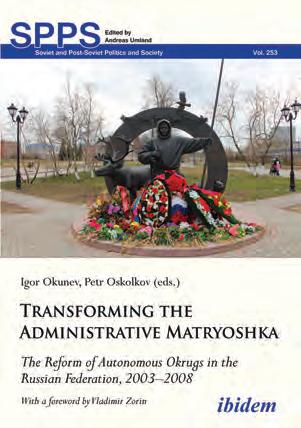
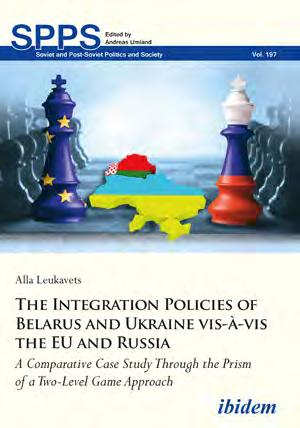
The escalating rivalry between the EU and Russia in their shared neighborhood creates important economic, political, and legal challenges for the lands-in-between. Belarus and Ukraine have received proposals of integration from both the EU and Russia. However, the extents to which they accepted these offers differ and result from a multitude of factors as well as their interplay affecting the policy choices of their governments. International integration is a foreign policy question, but it has a strong domestic dimension, too. Explaining various integration stances demands considering a country’s foreign and internal affairs. Alla Leukavets applies here Putnam’s two-level game-theoretical approach in combination with findings from Europeanization literature and democracy promotion studies. She develops various actor-centered and structural explanatory variables and applies them in the sub sequent empirical analysis. Her research results benefit from triangulation through primary docu ments analysis and semi-structured interviews with elites and experts in Minsk, Moscow, Brussels, and Washington, DC. The book analyses how the simultaneity of European and Eurasian integration challenged the two countries to make a major strategic integration choice. The study sheds light on the reasons for and genesis of the Ukraine Crisis, and on how external actors, such as the EU, can succeed in facilitating domestic reforms in Eastern Partnership countries.
Fedor, Julie; Makarychev, Andrey; Yurchuk, Yulia

2022.
34,00 , Paperback
978-3-8382-1676-8
SPECIAL SECTION: ISSUES IN THE HISTORY AND MEMORY OF THE OUN V YULIYA YURCHUK, ANDREAS UMLAND: Introduction: New Studies on the Record and Remembrance of the OUN(b) in World War II OLEKSANDR MELNYK: Ukrainian Nationalism, Soviet Power, and Le gitimacy Contests in the Kyiv Region, 1941–44: Actors, Issues, and Interpretations PER A. RUDLING: Managing Memory in Post-Soviet Ukraine: From “Scientific Marx-ism-Leninism” to the Ukrainian Institute of National Memory, 1991–2019 A DEBATE ON “USTASHISM,” GENERIC FASCISM, AND THE OUN II Featuring contributions by OMER BARTOV, JOHN-PAUL HIMKA, SERHIY KVIT, OLEKSANDR PAHIRIA, ANDREAS UMLAND, YULIYA YURCHUK ARTICLES MISCHA GABO WITSCH: What Has Happened to Soviet War Memorials since 1989/91? An Overview IGOR ILJUS HIN: “A Strong History for a Strong Nation:” A Review Essay on Roman Ponomarenko’s SS Galician Volunteer Regiments (1943–44) REVIEWS TATIANA KLEPIKOVA on Emily Channell-Justice; IVAN KURILLA on Mark Edele; ANASTASIA MITROFANOVA on Fabrizio Fenghi; THIJS KORSTEN on Krista A. Goff; ADRIEN NONJON on Robert Horvath; ROBERT F. BAUMANN on Shoshana Keller; ELISE WESTIN on Oksana Kis; STANISLAV PANIN on Keith A. Livers; MICHEL ANDERLINI on Erica Marat; JUHO KORHONEN on Aliide Naylor; NICK BAIGENT on Maya K. Peterson; AIJAN SHARSHENOVA on Peter Rollberg and Marlene Laruelle; KACPER WA?CZYK on Adnan Vanatsever; A. K. MAGOMEDOV and A. I. EMELIANOV on Evgenii Vittenberg
Russia’s Annexation of Crimea III A Debate on Prospect Theory and Explaining Russia’s Annexation of Crimea
/ 2022. 302 Seiten
34,00 , Paperback
978-3-8382-1736-9
Contents Special Section: Russia`s Annexation of Crimea III Gergana Dimova and Andreas Umland: Introduction. Perspectives on Russia’s 2014 Annexation of Crimea: Empirical and Theoretical Explo rations Greta Lynn Uehling: The Personal Stakes of Political Crisis: The 2014 Attempted Annexation of Crimea Kerstin S. Jobst: “Dark” and “Golden” Times: The Crimean Tatar Population under Tsarist and Soviet Rule (1783–1941) Jan Zofka: Agents of Separatism: Social Background to the Pro-Russian Movements in Crimea and the Moldovan Dniester Valley in Comparison (1989–95) A Debate on Pros pect Theory and Explaining Russia’s Annexation of Crimea Ion Marandici: Loss Aversion, Neo-Impe rial Frames, and Territorial Expansion: Using Prospect Theory to Examine the Annexation of Crimea Discussion Featuring contributions by Peter Rutland, Tor Bukkvoll, Mykola Kapitonenko, Rumena Filipova, Martin Malek, Ion Marandici Articles Chris Monday: Mikhail Putin (1894–1969) and Socia list Competition: Exploring a Neglected Branch of the Putin Family Tree Reviews: Inna Chuvychkina on Elizabeth Buchanan; Brendan M. McElmeel on Juliane Fürst; Olga Khabibulina on Hubertus Jahn; Elise Westin on Natalia Knoblock; Manne Wängborg on Andrei Kozyrev; Giulia Prelz Oltramonti on Anna Matveeva; Kimberly St. Julian-Varnon on David Rainbow; John (Ivan) Jaworsky on Josephine von Zitzewitz; Yana Ostapenko on Jessica Zychowicz; Dima Kortukov on Vladislav M. Zubok


Russian Disinformation and Western Scholarship: Bias and Prejudice in Journalistic, Expert and Academic Analyses of East European and Eurasian Affairs
/ 2022.
34,00
Paperback
978-3-8382-1746-8
Western academics, experts, and journalists specializing in Eastern Europe and Eurasia have grappled with two fundamental analytical crises in connection with the 1991 disintegration of the USSR and Russia’s 2014 invasion of Ukraine. Both crises were brought about by similar lack of understanding by scholars, think tank experts, and journalists of Moscow’s relations with its neighbors. Typically, they were characterized by a downplaying of the historic and current role of Russian great power nationa lism. The authors of this issue of JSPPS investigate how the Kremlin’s recent turbo-charging of Russia’s information warfare, 24-hour TV, and social media activity has expanded on traditional pro-Rus sian sentiments among Western academics, experts, and journalists. The contributors analyze the downplaying of Russian nationalism, misinterpretations of the 2014 crisis, sympathetic portrayals of Crimea’s occupation, and the use of the term “civil war” rather than “Russian–Ukrainian war” for the Donbas conflict in academia as well as the think tank world and media in the UK, Germany, Poland, Japan, USA, and Canada. The list of contributors includes: Olga Bertelsen (Tiffin University, Ohio), Paul D’Anieri (University of California at Riverside), Sanshiro Hosaka (University of Tartu), Andrei Znamenski (University of Memphis, Tennessee), and Sergei I. Zhuk (Ball State University, Indiana).








